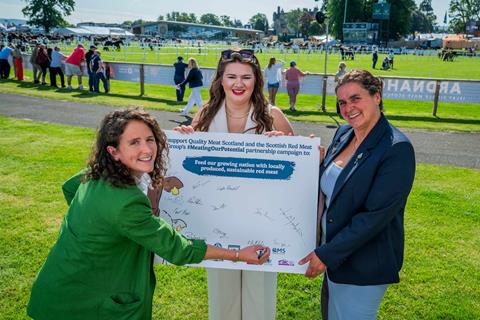Quality Meat Scotland (QMS) and the Scottish Red Meat Resilience Group (SRMRG) highlighted the support for the Scottish red meat industry at the 2025 Royal Highland Show (RHS).

Addressing more than 300 leaders across Scotland’s red meat supply chain – from farmers to retailers – on the opening day of the RHS 2025, QMS and the SRMRG have highlighted the “strong demand” and support for Scotland’s efficient, low-emissions beef, pork and lamb at a critical time for the industry.
QMS said that as more imported beef is being trialled in key UK retailers and there is a reported 6% increase in imported red meat on display in supermarkets this year (NFUS ShelfWatch), the Scottish red meat sector “stands united” in sharing their deep concerns for the long-term resilience of Scotland’s domestic supply chain.
At QMS’s annual show business breakfast, QMS chair Kate Rowell said: “The creepage of imports onto our shop shelves is in stark contrast to our wants, needs and the previous commitments made to Scotland. Our analysis shows red meat imports from non-EU countries such as Uruguay, New Zealand, Australia and Brazil rose strongly (up more than 55%) in the first third of 2025 compared to the same period of 2024 from a low base, approaching 10% of total imports.
“But research conducted on our behalf by EssenceMediacom in 2024 shows 83% of people in Scotland say they are opposed to purchasing red meat from elsewhere in the EU / world and 93% take product labels into consideration when buying food, with provenance and animal welfare ranking highly.
“Our recent survey conducted by Censuswide also highlights nearly three-quarters of us claim to actively seek Scottish red meat when shopping, driven by a desire to support Scottish farmers and the local economy, alongside trust in quality, freshness, and traceability. While 90% of Scottish red meat eaters say they would choose Scottish beef, lamb, or pork even if imported alternatives were 30% cheaper.
“At a time when we need our farmers to respond positively to the clear, growing demand for their globally sought-after beef, pork and lamb, the last thing we need is sourcing from overseas knocking their confidence to produce.”
Retailers urged to honour commitments
As part of the collaborative ‘Meating Our Potential’ partnership campaign, QMS and the SRMRG are urging retailers and the wider supply chain to honour their previous commitments and send a strong signal to Scotland’s producers that they back them over imports.
Rowell continued: “Scotland stands at a crossroads. Do we grow our own supply and build resilience or do we rely on imports that carry a higher climate cost?
“This is about backing Scottish producers, the wider red meat supply chain and the communities that depend on them, as well as the people who want to support them and keep Scottish beef, pork and lamb an essential part of their diets and our culture.”
The ‘Meating Our Potential’ campaign has already garnered strong support, said QMS. Alongside the 11 founding SRMRG organisations, which includes QMS, a growing number of retailers, processors, auctioneers, and farming groups have pledged their backing.
“We will continue to robustly make the case that trade deals should not come at the expense of Scotland’s farmers, crofters and wider agricultural sector.”
Mairi Gougeon, Cabinet Secretary for Rural Affairs
Cabinet Secretary for Rural Affairs Mairi Gougeon said: “Consumers want locally sourced, high quality produce like Scotch beef, lamb and Specially Selected pork and I am grateful to QMS for their work with processors and retailers on produce and market development, and the Scotland Food & Drink Partnership for their strategy setting out great examples that showcase the best of what we have to offer. This work shows the importance buyers put on country of origin and we will continue to work with other devolved Governments to ensure the Scotch meat brand continues to be recognised and valued.
“Whilst many trade levers are reserved to the UK Government, we will continue to robustly make the case that trade deals should not come at the expense of Scotland’s farmers, crofters and wider agricultural sector. We will also continue our direct reformed support to farmers, crofters and food producers.
“We have no policy to reduce livestock, as all that would do is replace our high-quality product with alternatives from elsewhere that may not be produced to the same high welfare and environmental standards. We agree with QMS that what is needed is for our globally renowned livestock to continue to be born, bred and slaughtered right here in Scotland, and this vision has the full backing of the Scottish Government.”

Stakeholders from SRMRG added their comments
Neil Wilson, president of the Institute of Auctioneers and Appraisers in Scotland (IAAS), said: “IAAS has been calling for action to reverse reducing suckler cow numbers for years now so we are delighted to see the red meat industry coming together to really get behind this campaign.
“QMS research is showing that GB national requirements for beef are going to rise so it presents beef farmers, auctioneers and others within the sector with a great opportunity to fill that growing demand.
“The British consumer wants to eat quality beef so why not offer them Scotch as the brand of choice?
“While some poorly executed research and misinformation about methane from cows has unfairly given cattle a bad name, we all know that Scottish farmers can produce top class beef with a much lower environmental footprint than global production whilst helping with biodiversity and nature restoration.
“So whether it’s two cows, 22 cows or more being put on, let’s work together to get more cows on the ground and get the best returns we can deliver through auction markets and the supply chain and back to the farmgate.”

Alan Brown, president, Scottish Association of Meat Wholesalers (SAMW), said: “It makes absolutely no sense to be importing red meat while our own high-quality, lower-emissions product is under pressure. We have a world-class supply chain in Scotland – from farm to processor – that delivers for consumers, communities, and climate.
“Retailers talk about supporting local and delivering on sustainability, but a 55% increase in non-EU imports and more imported red meat on shelves suggests otherwise. It’s time to stop the mixed messages.
“If we want a resilient, productive red meat sector in Scotland, then we need consistent signals and a firm commitment to back local. Otherwise, we risk undermining confidence and offshoring opportunity.”
“The data is clear: 90% of Scottish consumers would choose local meat even if imports were significantly cheaper.”
Robert Neil, NFU Scotland
Robert Neil, vice president of NFU Scotland, said: “Scotland’s farmers are delivering high-quality, sustainably produced red meat that meets the highest standards anywhere in the world. Yet, despite overwhelming public support for local sourcing, we’re seeing cheap, lower-standard imports creeping further into our food system. That’s not just economically short-sighted – it’s a betrayal of trust.
“The data is clear: 90% of Scottish consumers would choose local meat even if imports were significantly cheaper. But that choice is being quietly taken away by sourcing decisions made behind closed doors. Retailers must act now to honour their commitments to Scottish agriculture and ensure the shelves reflect what their customers actually want: quality, provenance, and support for Scottish producers.”
National Sheep Association (NSA) Scotland chair Peter Myles said: “Like a group of confused horses at the start of the Grand National, the Scottish livestock sector is waiting impatiently for the Government to fire the starting gun — and when it does, we’ll be more than ready to clear the fences and ‘meat’ our potential.”
Donna Smith, chief executive at Scottish Crofting Federation, said: “Scottish Crofting Federation feel it is important to support the ‘Meating Our Potential’ campaign.
“In Scotland, a continued focus on more high quality, locally produced meat is vital, as is strengthening local supply chains rather than resorting to more imports.
“We hope this campaign highlights the issue and stimulates some action to safeguard the red meat industry for the future.”















